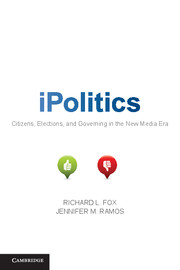Book contents
- Frontmatter
- Contents
- List of Tables and Figures
- Contributors
- Preface and Acknowledgments
- Introduction
- Section I The Shifting Media Universe and News Consumers
- 1 More Sources, Better Informed Public? New Media and Political Knowledge
- 2 Rethinking Television's Relationship to Politics in the Post-Network Era
- 3 Interplay
- Section II Campaigns and Elections in the New Media Environment
- Section III Civic Mobilization and Governance in the New Information Age
- Index
- References
3 - Interplay
Political Blogging and Journalism
from Section I - The Shifting Media Universe and News Consumers
Published online by Cambridge University Press: 05 June 2012
- Frontmatter
- Contents
- List of Tables and Figures
- Contributors
- Preface and Acknowledgments
- Introduction
- Section I The Shifting Media Universe and News Consumers
- 1 More Sources, Better Informed Public? New Media and Political Knowledge
- 2 Rethinking Television's Relationship to Politics in the Post-Network Era
- 3 Interplay
- Section II Campaigns and Elections in the New Media Environment
- Section III Civic Mobilization and Governance in the New Information Age
- Index
- References
Summary
State Representative Nikki Haley had vaulted into the front-runner position in the 2010 Republican South Carolina gubernatorial primary with the endorsement of former Alaska governor Sarah Palin when a prominent South Carolina blogger announced on his blog that he had had “an inappropriate physical relationship” with Haley while she was married. Immediately, the candidate denied the charge by the blogger, who actually was a supporter of Haley. She asserted she had been “100% faithful to my husband” and accused the blogger of making the accusation merely to attract attention to his blog. The following week, a South Carolina political consultant who worked for an opposing candidate claimed that he also had had a sexual encounter with Haley when they were both attending an out-of-state convention.
Traditional media picked up the blogger's accusation about Haley and quickly published it. The fact that Haley had already issued a statement responding to the blogger made the decision to publish easier. By comparison, in 1996 a similar rumor circulated about an affair of South Carolina's then-governor with his communications director. Reporters investigated the allegation for several months and ultimately published it a year later when a gubernatorial candidate raised the charges in an election campaign. Whereas the governor in 1996 could ignore the rumor for a time, Haley assumed the story would move quickly beyond a single blog and addressed it immediately.
- Type
- Chapter
- Information
- iPoliticsCitizens, Elections, and Governing in the New Media Era, pp. 76 - 100Publisher: Cambridge University PressPrint publication year: 2011



